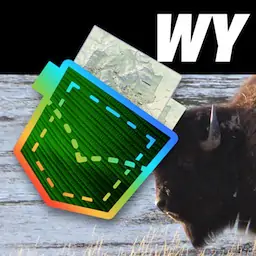Winter Wildlife Viewing GuideNational Elk Refuge |
Winter Wildlife Viewing Guide for the National Elk Refuge, a National Wildlife Refuge (NWR) in Wyoming. Published by the U.S. Fish & Wildlife Service (USFWS).
featured in
| Wyoming Pocket Maps |  | |
| Yellowstone Pocket Maps |  |
U.S. Fish & Wildlife Service
This blue goose, designed
by J.N. “Ding” Darling, is
the symbol of the National
Wildlife Refuge System.
Winter Wildlife Viewing
Welcome to the National Elk Refuge, a
popular destination for viewing elk, bighorn
sheep, and other wildlife during the winter
season.
Winter presents an excellent opportunity
to view wildlife on the Refuge, but it is also
a stressful time of year for wildlife. Their
survival is dependent upon conserving
energy. Wildlife may not display visible
signs of stress that indicate they are being
affected by human interactions, but
repeated disturbances from the presence
of humans can significantly impact their
overall health and survival.
To decrease stress to wildlife, please keep
a minimum distance of 25 yards from most
wildlife and 100 yards from wintering elk.
Wildlife should not be surrounded or cut
off from their direction of travel.
For the protection of wildlife, habitat, and
other visitors, please observe all regulations
and wildlife viewing guidance.
National Elk Refuge
Winter Wildlife Viewing Guide
■■
Refuge Road
Elk, bighorn sheep, and other wildlife are
frequently seen close to the Refuge Road.
To accommodate the number of visitors on
this road and to protect wintering animals,
the following regulations are in place.
■■
■■
Visitor and Wildlife Safety
North Highway 26/89
North Highway 26/89 runs along the
western boundary of the National Elk
Refuge.
■■
■■
■■
Several pullouts are located along the
highway, providing safe opportunities
to observe elk.
Stopping a vehicle or parking on the
shoulder of the highway is discouraged
because of safety considerations on the
busy road.
To reduce disturbance to migrating and
wintering elk and other wildlife, the
North Highway 89 pathway that runs
parallel to the highway from Flat Creek
to the Gros Ventre River is closed from
November 1 through April 30.
Crossing the pathway and approaching
the Refuge fence to take photographs or
view wildlife violates the closure and its
purpose. The presence of humans at or
near the fence often causes nearby elk
to bolt and leave the area. Continual
disturbance throughout the winter can
have a cumulative effect on the elk,
adding to their weakened condition
brought about by the rigors of the
long season.
■■
■■
■■
■■
The speed limit on the Refuge Road is
30 mph. Travel speeds should be adjusted
to accommodate for winter driving
conditions that may include ice, fog,
drifting snow, and limited visibility.
Vehicles should use an established pullout
when viewing wildlife in order to keep
the Refuge Road open to moving traffic.
This road is also used by large vehicles
including delivery trucks, service
vehicles, snow plows, and Refuge
equipment which cannot easily
maneuver around other vehicles
stopped in the road.
Drivers must not stop in the road when
other vehicles are present. When traffic
is approaching in either direction,
vehicles must continue moving or use an
established pullout to keep the road clear.
Road shoulders drop off dramatically.
Please use caution as ditches and uneven
surfaces may be hidden by snow.
Off-road travel by vehicle or on foot
is prohibited.
Spotting scopes and tripods should not
be set up in the road.
■■
Visitors traveling on the Refuge Road
should watch for and respect all posted
road closures and restricted routes.
Some roads or driveways may be open
for administrative traffic only or for
permitted hunters accessing hunt areas
during designated periods.
Bighorn Sheep
Bighorn sheep are frequently seen on
or near the Refuge Road.
Bighorn sheep are identified as a Species
of Greatest Conservation Need (SGCN)
by the Wyoming Game & Fish Department.
SGCN are species whose conservation
status warrants increased management
attention. Local populations of bighorn
sheep, along with other herds across the
Rocky Mountain west, have experienced
significant declines in population due to
pneumonia outbreaks.
The bighorn sheep near the Refuge Road
often boldly approach vehicles to lick and
ingest the salts and minerals found on the
vehicle’s surface. This can have a harmful
effect on sheep health, and it increases the
potential for spreading diseases such as
pneumonia.
While viewing bighorn sheep, visitors
may notice some animals with GPS collars.
These collared animals help wildlife
managers identify migration corridors
between winter and summer ranges,
increasing knowledge about the potential
scope of future pneumonia outbreaks.
Photography
We invite you to view and photograph
the wildlife on the National Elk Refuge
and enjoy the experience. Note, though,
that photographing and sharing images
of inappropriate human interactions with
wildlife is discouraged as it can further
promote or encourage these detrimental
practices.
Fla
tC
re
ek
Parking area
26
89
M
F
C
lat
re
ill
er
Bu
tte
Refuge Road
Parking locations are approximate.
Maps are not to scale.
ek
N
26
89
National Elk
Refuge
Jackson Hole &
Greater Yellowstone
Visitor Center
Miller
Cabin
National Elk Refuge
Valley Floor
Elevation 6,237
Accessibility Information
Equal opportunity to participate in and
benefit from programs and activities of the
U.S. Fish and Wildlife Service is available
to all individuals regardless of physical or
mental ability. Dial 711 for a free connection
to the State transfer relay service for
TTY and voice calls to and from people
with hearing and speech disabilities.
For more information or to address
accessibility needs, please contact the
Refuge staff at 307 / 733 9212, or the
U.S. Department of the Interior, Office
of Equal Opportunity, 1849 C Street,
NW, Washington, D.C. 20240.
Refuge boundary
Route to Refuge
North Highway
89 pathway
Visitor center
Historic site
Parking area
Moose
Moran
East Broadway
Town
Square
National Elk Refuge
N Jean
King
Willow
Re
fug
e
Center
Ro
ad
Gill
Gros Ventre
Teton
Jackson Hole
& Greater Yellowstone
Visitor Center
Town of Jackson
Jackson Hole &
Greater Yellowstone Visitor Center
532 N. Cache Street
Jackson, WY 83001
National Elk Refuge
Administrative Office
675 E. Broadway Avenue
Jackson, WY 83001
307 / 733 9212
http://www.fws.gov/refuge/national_elk_
refuge
For State transfer relay service
TTY / Voice: 711
Fla
tC
re
ek
U.S. Fish & Wildlife Service
http://www.fws.gov
26
89
M
Fla
r
tC
ee
ill
er
Bu
tte
For Refuge Information
1 800 / 344 WILD
Refuge Road
November 2017
Parking locations are approximate.
Maps are not to scale.
k
N


